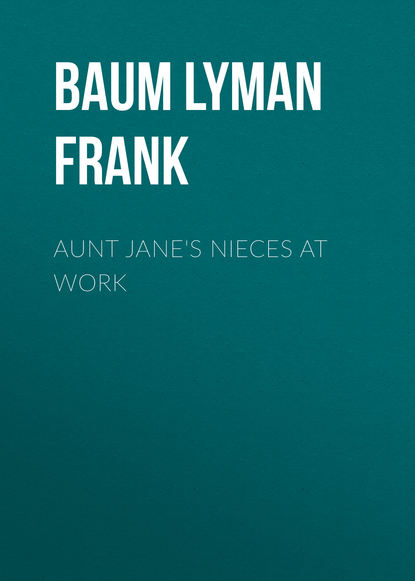По всем вопросам обращайтесь на: info@litportal.ru
(©) 2003-2024.
✖
Aunt Jane's Nieces at Work
Настройки чтения
Размер шрифта
Высота строк
Поля
At this, Louise made a signal and the fifty children so grotesquely covered with signs rose and stepped forward upon the stage. The orchestra struck up an air and the little girls sang the following ditty:
"Teas and soaps,
Pills and dopes,
We all must advertise.
Copper cents,
Not common sense.
Are the things we prize.
We confess
Such a dress
Isn't quite becoming,
But we suppose
Hopkins knows
This keeps business humming."
As the girls ceased singing, Kenneth said:
"To the encroaching advertiser these signs of the times are considered legitimate. There is no respect for personal privacy on the advertiser's part. Once they used only the newspapers, the legitimate channels for advertising. Then they began painting their advertising on your fences. When the farmers protested against this the advertisers gave them a few pennies as a sop to quiet them. After this they gave you small sums to paint the broad sides of your barns, your board fences, and to place signs in your field. If you allowed them to do so they would paint signs on the dresses of your children and wives, so callous are they to all decency and so regardless of private rights. Look on this picture, my friends, and tell me, would you prefer to see this – or this?"
At the word each child pulled away the sign-painted slip and stood arrayed in a pretty gown of spotless white.
The surprise was so complete that the audience cheered, shouted and laughed for several minutes before silence was restored. Then the children sang another verse, as follows:
"Now it is clear
That we appear
Just as we should be;
We are seen
Sweet and clean
From corruption free:
We're the signs
Of the times —
Fair as heaven's orbs.
If we look good,
Then all men should
Vote for Kenneth Forbes!"
The cheering was renewed at this, and Mr. Hopkins became angry. He tried to make himself heard, but the popular fancy had been caught by the object lesson so cleverly placed before them, and they shouted: "Forbes! Forbes! Forbes!" until the Honorable Erastus became so furious that he left the meeting in disgust.
This was the most impolite thing he could have done, but he vowed that the meeting had been "packed" with Forbes partisans and that he was wasting his time in addressing them.
After he was gone Kenneth resumed his speech and created more enthusiasm. The victory was certainly with the Republican candidate, and the Elmhurst people returned home thoroughly satisfied with the result of the "joint debate."
CHAPTER XVI
A CLEW AT LAST
The servants at Elmhurst all ate in a pleasant dining room with windows facing a garden of geraniums. Tom Gates had been at the house two days before he encountered Eliza Parsons at the table, for the servants were not all able to take their meals at the same time.
It was at luncheon, the day of the joint debate at Fairview, that the young man first met Eliza, who sat opposite him. The only other person present was old Donald, the coachman, who was rather deaf and never paid any attention to the chatter around him.
As he took his seat Tom gave a half-frightened glance into Eliza's face and then turned red as she smiled coquettishly and said:
"Dear me! It's the young man who called me his dear Lucy."
"You – you're very like her," stammered Tom, unable to take his eyes from her face. "Even now I – I can't believe I'm mistaken."
She laughed merrily in a sweet, musical voice, and then suddenly stopped with her hand on her heart and cast at him a startled look that was in such sharp contrast to her former demeanor that he rose from his chair.
"Sit down, please," she said, slowly. And then she studied his face with sober earnestness – with almost wistful longing. But she shook her head presently, and sighed; and a moment later had regained her lightness of manner.
"It's a relief to have a quiet house for a day, isn't it?" she asked, eating her soup calmly. "I'll be glad when the election's over."
"Have you been here long?" he asked, although Beth had told him of Eliza's coming to Elmhurst.
"Only a short time. And you?"
"Two days," said he. "But where did you live before you came here?"
She shook her head.
"I wish you would answer me," he begged. "I have a reason for asking."
"What reason?" she demanded, suddenly serious again.
"Two people have never lived that were so near alike as you and Lucy Rogers."
"Indeed?"
"Will you show me your left arm?"
"No."
She was again studying his face.
"If you are Lucy Rogers you have a scar there – a scar where you burned yourself years ago."
She seemed frightened for a moment. Then she said:
"I have no scar on my left arm."
"Will you prove it?"
"No. You are annoying me. What did you say your name is?"
"Tom Gates."
She was thoughtful for a moment and then shook her head.
"I have never heard of you," she declared, positively, and resumed her eating.

















